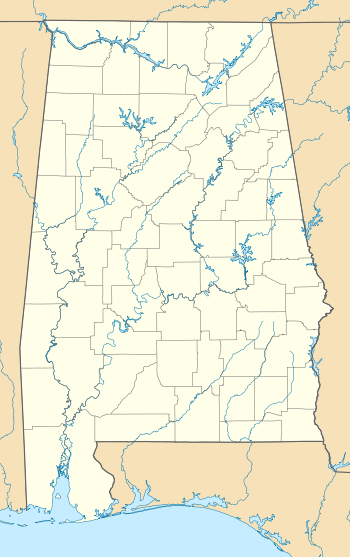Crane Hill, Alabama
| Crane Hill, Alabama | |
|---|---|
| Unincorporated community | |
 Crane Hill, Alabama Location in Alabama. | |
| Coordinates: 34°05′38″N 87°03′47″W / 34.09389°N 87.06306°W | |
| Country | United States |
| State | Alabama |
| County | Cullman |
| Area | |
| • Total | 44.1 sq mi (114.219 km2) |
| Elevation | 828 ft (252.4 m) |
| Population | |
| • Total | 2,341 |
| Time zone | Central (CST) (UTC-6) |
| • Summer (DST) | CDT (UTC-5) |
| ZIP code | 35055 |
| Area code(s) | 256 |
| GNIS feature ID | 151747[1] |
Crane Hill is an unincorporated community in Cullman County, Alabama, United States. This community is located in Southwestern Cullman County, Alabama. The community of Crane Hill, Alabama can trace its history back to 1806 when the first settlers recorded their land titles. This area is named after the Sandhill Crane[2] who fished the streams and roosted on a hill located just north of Mt. Zion Road and part of the Kirby Lay property. It was from this large hill of roosting cranes that Crane Hill took its name.
Crane Hill
The Crane Hill's Community consist of several businesses and the following Government buildings.
- Four volunteer fire departments
- One senior center
- One Post Office (35053)
- One public park (Dowling Memorial Park)
- No traffic lights
This area is nestled at the foot of the Appalachian Mountains, it offers a landscape with rock out crops and graceful meadows all well endowed with indigenous plants, wild flowers and a wide variety of wild animals. Smith Lake and many fresh water streams wind through the hills and rocks offering residents an opportunity to fish and enjoy one of the most attractive locations in Alabama. Many residents are family in this close knit community and several families have the distinction of having lived as many as six generations in this area.
Crane Hill School
- In 1904, Crane Hill Jr. High School was built and is now the Masonic Lodge which was relocated to its present site in 1934. That same year the school it was replaced by a brick structure and was known as Crane Hill School.
- In 1938, the school was destroyed by fire which was reported to have been started by an electrical problem.
- In 1939, the citizens of Crane Hill pulled together to build a new red brick school using trees on site and a saw mill owned by Ivan Williams. Once completed the school was named after the then current superintendent of Education in Cullman County, H.G. Dowling.
- In 1996, Labor Day, Dowling Jr. High School was vandalized and burnt to the ground and was never rebuilt. It was a heart wrenching event to many residents because the school was the main spectacle of the community.
Dowling Memorial Park
After the fire of 1996, the citizens of Crane Hill once again try to raise money to rebuild the School, but the Cullman County Board of Education did not see at need at the time for a school at the location. In 1997 in an effort to raise money was the start the Sweet Tater Festival. This Festival has been ongoing since. Currently the director is Tony Leonardi.
Churches
Mt. Hope Baptist Church is notably the oldest church in Crane Hill. The first church was built in 1877, the same year Cullman County came into existence. In 1923, the church was destroyed by a fire but was soon rebuilt in 1962. Delbert Freeman is the minister of this church.
Other Churches include
- Mt.Hope Baptist Church
- Sulphur Springs Baptist Church
- Flat Rock United Methodist Church
- Livingston Chapel United Methodist Church (www.livingston-chapel.com)
- Beulah Church of the Nazarine
- New Mt.Zion Baptist Church
Historic buildings
- Crane Hill Masonic Lodge is listed on both the Alabama Register of Landmarks and Heritage and the National Register of Historic Places.
Small Facts
- County Road 222[3] is the main road that goes through Crane Hill.
- The crime rates in the community is very low.[4]
- This area is politically conservative with strong Christian morals.
- Has Several Bed and Breakfasts
Demographically
- White population: 2,467
- Black population: 0
- American Indian population: 8
- Asian population: 1
- Native Hawaiian and Other Pacific Islander population: 4
- Some other race population: 1
- Two or more races population: 12
References
| |||||||||||||||||||||||||||||
